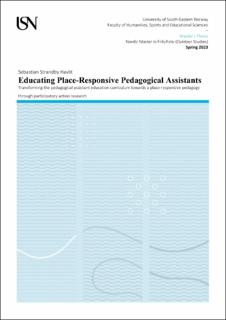Educating Place-Responsive Pedagogical Assistants
Master thesis
Permanent lenke
https://hdl.handle.net/11250/3075149Utgivelsesdato
2023Metadata
Vis full innførselSamlinger
Sammendrag
Background: The development of outdoor education has been moving in a questionable direction for a long time. A focus on technical skills and elements of risk, where the landscape becomes a backdrop for human activities, is the dominant approach when conducting outdoor education. Purpose: As an alternative to traditional outdoor education, this thesis explores the implementation of a place-responsive pedagogy in the pedagogical assistant education in Denmark.
Research design: The qualitative research conducted is defined as participatory action research, with an emphasis on understanding and promoting transformation, in collaboration with the participants. The empirical material has been analyzed and discussed through a sociolinguistic lens, emphasizing the theories of Bernstein (1982/2000, 1971/2003, 1975/2003, 1990/2003).
Methods: A workshop was conducted, which introduced the place-responsive pedagogy through a verbal presentation, followed by embodied exercises. The workshop participants were seven teachers of the pedagogical assistant education and the education leader. As a part of the workshop, the teachers had to develop placeresponsive ideas that could be implemented in the specific courses taught in the program. A post-workshop questionnaire was designed to gather empirical material that could be used to evaluate the workshop and the implementation of the place-responsive ideas in the curriculum.
Findings and conclusion: The findings suggest it is possible to implement a place-responsive pedagogy in the pedagogical assistant education through a workshop that utilizes an invisible pedagogy with a weak framing of knowledge. Through the workshop, the teachers gained knowledge, which made them capable of developing place-responsive ideas. The ideas developed aligned with the learning outcomes of the specific courses where they were implemented. Implementing the ideas developed by the teachers is one way of raising the standard of the pedagogical assistant education. The ideas address sustainability issues, connect local actions to a global perspective, and develop personal relationships with the land. The workshop was an effective method, in promoting a transformation of the curriculum, towards a more place-responsive pedagogy that educates for a sustainable future. Implementing the place-responsive pedagogy in the pedagogical assistant education fosters inclusion, rather than exclusion, improvement of students’ care for specific places, nature, and the environment in general, without diminishing the original learning outcomes.
